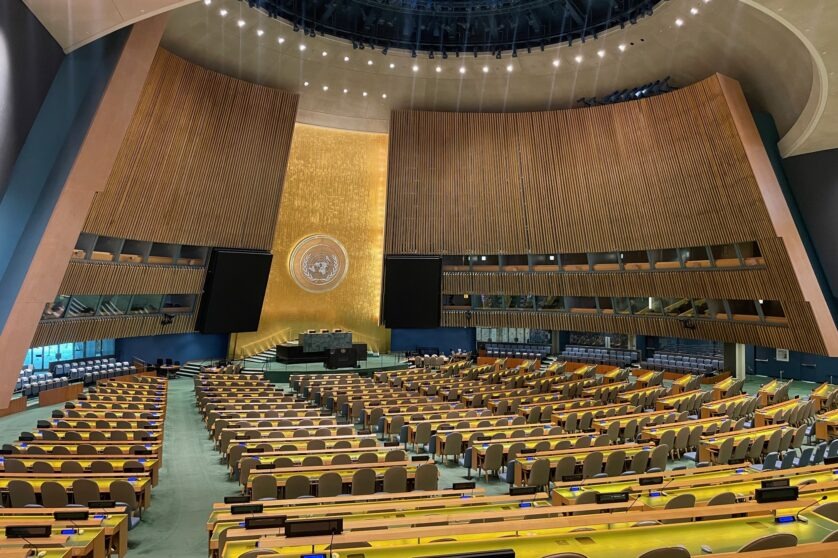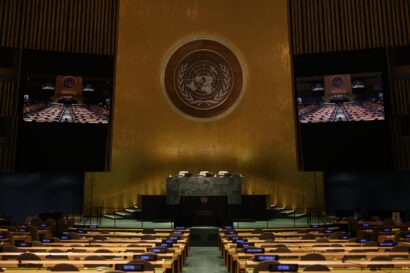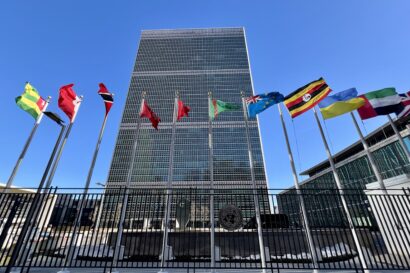International corporate taxation is undergoing a historic institutional shift. While recent years have been marked by growing deadlock within the OECD-led Inclusive Framework on Base Erosion and Profit Shifting (BEPS), a new process has now begun under the auspices of the UN.
As part of this process, countries have agreed to negotiate two early Protocols by 2027, alongside the broader Framework Convention on International Tax Cooperation, or the UN Tax Convention (UNTC). The first Protocol will address the ‘taxation of income derived from the provision of cross-border services in an increasingly digitalized and globalized economy’, while the second will focus on ‘prevention and resolution of tax disputes’. This represents one of the most significant developments in global tax governance in decades, potentially reshaping international tax cooperation and giving developing countries greater voice in shaping global tax rules.
Substance negotiations for a new UNTC are now in full swing, with the first two rounds concluding in New York last month, and a third session coming up in Nairobi in November.
We at ICTD have been closely following the process and the broader debates surrounding it (see our latest work here!). For this purpose, we have put together this reading list to help navigate the growing literature, which is thematically divided into three parts: this first part is on the UN process and institutional context. Stay tuned for part 2 on Protocol 1 on taxation of cross-border income and part 3 on Protocol 2 on resolving disputes.
Whether you’re new to the topic or following developments closely, these readings offer essential background and useful analyses.
We’ll be updating all three parts of this reading list regularly as new relevant materials emerge, so check back for the latest resources.
On the UN process towards a Framework Convention
- [ACADEMIC] Special Edition on the UN Process, Intertax (2025): This issue from Intertax brings together articles tracing historical lessons, power asymmetries, geopolitical constraints, and institutional reform proposals to explore how the UN’s emerging tax cooperation framework could reshape multilateral tax governance amid shifting global dynamics.
- [ICTD] Scenarios for Negotiating a UN Framework Convention on International Tax, by Frederik Heitmüller (2025): Analyses debates from the UN’s 2024 Ad Hoc Committee using a strategic, normative lens to show how the global South must navigate a trilemma – trading off binding decision-making, substantive scope, and inclusivity – to shape an incremental yet more equitable tax convention.
- [ACADEMIC] Plurilateralism in International Tax Law: A Unique Chance for the UN Framework Convention, by Peter Hongler and Simon Habich (2025): Argues that World Trade Organisation (WTO)-style plurilateralism, embedded in a UN tax framework, could overcome OECD-driven complexity and exclusivity, enabling the most meaningful development in global tax governance in over a century.
- [CIVIL SOCIETY] A roadmap for negotiating the protocols to the United Nations Framework Convention on Tax, International Institute for Sustainable Development (IISD) (2025): Provides negotiators with a structured guidance on the importance, challenges, and strategic options for early protocols on cross-border services taxation and dispute resolution to structure the negotiations for a UN tax framework.
- [CIVIL SOCIETY] Aligning Tax Cooperation with Human Rights in the UN Tax Convention, by Maria Emilia Mamberti, Centre for Economic and Social Rights (CESR) (2025): Explores how integrating international human rights law into the UN Tax Convention can shape interpretation, enforcement, and participation so that global tax cooperation advances legal obligations on equality, transparency, and economic rights.
- [ACADEMIC] Review of the Inputs to the Issues Notes in preparation for the 1st and 2nd Sessions of the Intergovernmental Negotiating Committee to draft a United Nations Framework Convention on International Tax Cooperation and two early protocols, by Sergio Messina (2025): Synthesises key points from workstream issues notes and public submissions ahead of the first two negotiating sessions, offering a shared basis for collective deliberation on the UN Tax Convention’s structure and priorities.
- [ACADEMIC] The Illusion of Inclusivity: Analysing the Psychological Factors Affecting Developing Countries in Consensus-Driven International Tax Negotiations, by Gautham S. Mukundan (2025): Examines how cognitive biases, peer conformity pressures, and capacity constraints systematically limit developing-country participation in OECD consensus-based tax talks, proposing psychological safeguards to inform UN tax convention design.
- [ACADEMIC] Towards Global Tax Justice: An Interdisciplinary Evaluation of the UN Framework Convention in International Tax Cooperation, by Giulio Allevato and Anna E. Di Filippo (2024): Evaluates whether the UN Tax Convention’s transparent, participatory design and its commitments to fiscal sovereignty and relational duties can jointly transform global tax governance and address structural inequalities in taxing rights.
- [ACADEMIC] Between Revolution and Rhetoric: The UN Vote and the Future of International Tax Cooperation, Rasmus C. Christensen (2024): Examines whether the November 2023 UN vote for a tax framework convention represents a genuine turn toward inclusive multilateralism or remains largely rhetorical in international tax politics.
- [ACADEMIC] Substantive Tax Sovereignty and Global Legal Pluralism: Towards More Inclusive and Effective International Tax Cooperation, Carla De Pietro (2024): Proposes a global legal pluralism approach that recognises substantive tax sovereignty while embracing overlapping jurisdictions as a realistic pathway towards a more inclusive and effective UN-led tax cooperation.
- [CIVIL SOCEITY] The UN Tax Convention and why it matters for reforming global tax governance, by Francis Kairu, Tax Justice Network Africa (2024): Provides context on current international tax cooperation, highlights the OECD’s dominance, and outlines how a UN tax convention could rebalance power and reshape global rules for fairer multilateral engagement.
- [ICTD] The International Tax Regime Complex: Understanding Change in Global Tax Governance, by Katharina Kuhn, Lucinda Cadzow, Frederik Heitmüller, Martin Hearson, and Tovony Randriamanalina (2024): Distils three international relations insights – regime complexity, legitimacy deficits across input, throughout and output, and path dependence – to explain how incremental institutional change will shape the evolving UN tax convention process.
- [ACADEMIC] How can regional cooperation help the enhancement of regional economic development and strengthen the voices of developing countries in Global Tax Negotiations?, by Irma Mosquerra Valderrama (2024): Maps regional trade and tax bodies across Asia, Africa, Latin America, and the Caribbean and argues that better coordination, rather than proliferation, of these entities is essential to enhancing regional development and strengthening developing countries in global tax talks.
- [ACADEMIC] A Fresh Start: Searching for Consensus in International Tax Reform, by Sol Picciotto (2024): Places current UN negotiations for a tax cooperation convention in broader historical and institutional context and argues that achieving sustainable consensus on multinationals’ unitary taxation could resolve the growing polarisation between residence and source tax regimes.
- [INTERGOVERNMENTAL ORGANISATION] The Design of a UN Framework Convention on International Tax Cooperation, by Sol Picciotto, South Centre (2024): Sets out how a binding UN framework with inclusive participation, protocols for administrative coordination and unitary taxation, and public accountability could reset global tax governance away from OECD technocracy toward a more balanced institution.
- [ACADEMIC] International institutions in global tax governance, by Miranda Stewart (2024): Identifies key actors, activities, and mechanisms shaping global tax governance across institutions such as the UN, OECD, World Bank, and IMF, mapping emerging multilateral tax law dynamics.
- [ACADEMIC] The role of the United Nations in ensuring equitable tax policies for developing countries, by Afton Titus (2024): Argues that creating a dedicated UN tax body would ensure developing countries are directly involved in agenda-setting and policy decisions, transforming international tax governance into a more participatory process.
- [ACADEMIC] The Reform of the Institutional Structure of International Taxation, by Philip Baker (2023): Warns that rejecting OECD-led processes without empowering a strong UN framework risks leaving global tax governance fragmented and ineffective, urging institutional reforms to prevent a vacuum in multilateral tax cooperation.
- [ICTD] Inclusive and Effective International Tax Cooperation: Views From the Global South (Input Paper to the UN Secretary General’s report), by Lucinda Cadzow, Martin Hearson, Frederik Heitmüller, Katharina Kuhn, Okanga Okanga, and Tovony Randriamanalina (2023): Draws on interviews with thirty-three mostly low-income country officials and comparative governance analysis to show how the UN could carve out a more inclusive, effective role in today’s fragmented global tax regime.
- [ACADEMIC] Promotion of Inclusive and Effective Tax Cooperation at the United Nations (Input Paper to the UN Secretary General’s report), IBFD (2023): Analyses institutional mandates, membership criteria, and legal instruments across OECD and UN tax bodies and informs on what can be learned for the UN Framework Convention.
- [ACADEMIC] Policy Note: Beyond the 2-Pillar Solution: A Case for a Global Income Tax and the Creation of the International Tax Organization, by Natalia Quiñones (2023): Proposes replacing nexus-based tax rules with a global income tax computed via Pillar 2 effective tax rate norms, piloted on Pillar 1 multinationals and overseen by a new International Tax Organisation, coupled with a transitional climate-focused spending mechanism.
- [ACADEMIC] The Unruly World of Tax: A Proposal for an International Tax Cooperation Forum, by H. David Rosenbloom, Noam Noked, and Mohamed S. Halal (2023): Argues that tax cooperation is fractured and proposes a “like-minded groups” forum that enables aligned countries to coordinate on evasion and harmonisation efforts, overcoming current institutional barriers.
- [ACADEMIC] The United Nations in Global Tax Coordination: Hidden History and Politics, by Nikki J. Teo (2023): Reconstructs how the UN Fiscal Commission, rooted in its League of Nations prehistory, became a rare moment of inclusive postcolonial tax norm-setting before being sidelined by Cold War power plays, shaping the modern tax regime’s contours.
- [CIVIL SOCIETY] Proposal for a United Nations Convention on Tax, by Tove Ryding, Eurodad (2022): Outlines a binding UN convention on taxing rights, transparency, dispute resolution, and capacity-building, structured through framework principles and detailed protocols to create coherent and inclusive global tax governance.
- [INTERGOVERNMENTAL ORGANISATION] Streamlining the Architecture of International Tax through a UN Framework Convention on Tax Cooperation, by Abdul Muheet Chowdhary and Sol Picciotto, South Centre (2021): Argues that a UN framework convention could streamline fragmented governance by uniting multiple tax institutions under a universal and inclusive mandate and democratic oversight, offering a coherent structure to embed political accountability.
- [ICTD] At the Table, Off the Menu? Assessing the Participation of Lower-Income Countries in Global Tax Negotiations, by Martin Hearson, Rasmus Corlin, and Tovony Randriamanalina (2020): Examines how lower-income countries engage in OECD-led tax negotiations, revealing structural asymmetries, capacity constraints, and agenda bias that limit influence – despite formal inclusion – thus calling for more equitable multilateral negotiation platforms.
- [ACADEMIC] A multilateral tax treaty: designing an instrument to modernise international tax law, by Dirk Broekhuijsen (2017): Drawing on a normative and pragmatic view, the author proposes a management-focused approach for an international tax convention by integrating insights from political science and legal philosophy.
Primary Data
On the main negotiation process
- Issue Notes of Co-Leads from Workstreams I, II and III, UN DESA (August 2025)
- Inputs to first and second sessions of the International Negotiation Committee on the UN Framework Convention on International Tax Cooperation (July 2025)
On the Ad Hoc Committee (2024)
- Terms of reference for a United Nations Framework Convention on International Tax Cooperation, UN DESA (January 2025)=
-
On the pre-agenda making phase (2022-2023)
- Promotion of inclusive and effective international tax cooperation at the United Nations, UN Secretary General (July 2023)
- Resolution 77/244 adopted by the General Assembly on 30 December 2022, UN General Assembly (January 2023)
-



